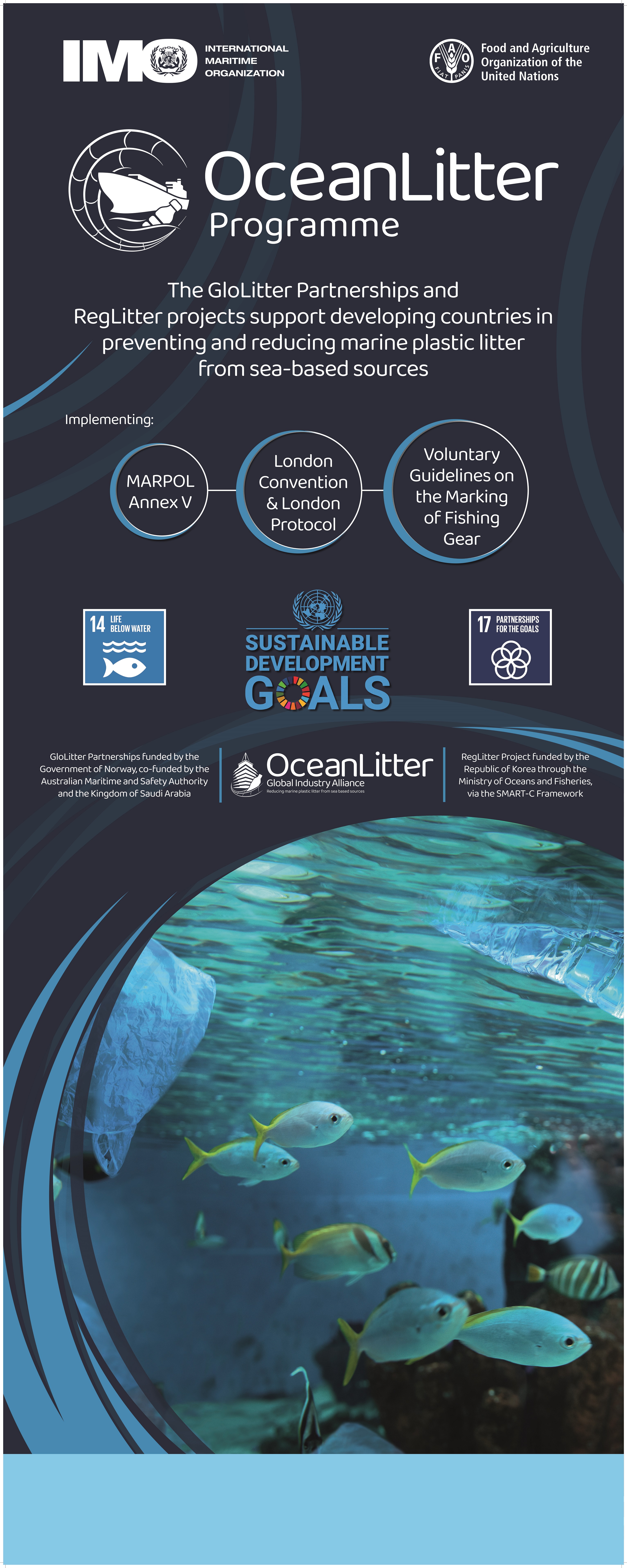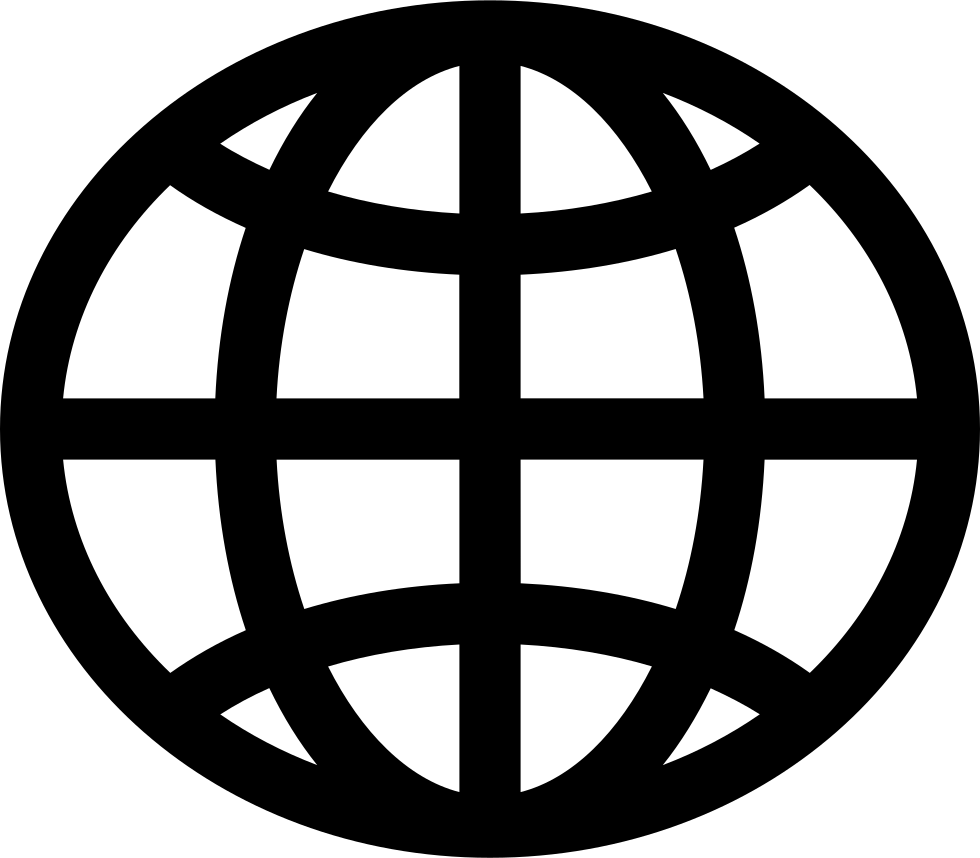OceanLitter Program (includes 3 projects: GloLitter Partnerships, RegLitter and PRO-SEAS projects)
International Maritime Organization (UN), Food and Agriculture Organization (UN)
(
United Nations / Multilateral body
)
#OceanAction57922
Description
The IMO OceanLitter Programme is home to a growing portfolio of projects targeting the reduction and prevention of marine plastic litter from sea-based sources.
The 3 projects, namely GloLitter Partnerships project (global), RegLitter project (Regional-Asia) and PRO-SEAS project (global with targeted support to 4 selected countries) are housed under the OceanLitter Programme to allow for efficient coordination and knowledge-sharing between the projects to beneficiary countries in the drive to combat marine plastic litter from the shipping and fisheries industries. The Programme ensures continued positive progress towards a healthier marine ecosystem through implementation of the international conventions and instruments of IMO such as Marpol Annex V, London Convention/Protocol and implementation of the IMO Action Plan to Address Marine Plastic Litter from Ships, as well as FAO Voluntary Guidelines on the Marking of Fishing Gear, and towards the relevant Sustainable Development Goals of the United Nations.
Project coordination teams from IMO and FAO work closely on the jointly implemented projects, bringing together representatives from both the maritime and fisheries administrations of participant countries to harmonize efforts to support national legal, policy and institutional reform, promote the provision of adequate Port Reception Facilities to receive plastic waste, facilitate cooperation to share best practices at the regional level, empower women in finding solutions to issues of marine plastic litter, and spearhead marking systems to combat discarded fishing gear.
The programmatic approach allows for each project in the multi-donor portfolio to benefit from the work undertaken in other - enabling efficient use of the resources available, enhancing cooperation to assist member states, and ensuring continued progress towards the shared objectives in management of sea-based marine plastic litter (SBMPL).
Lead Implementing partners: International Maritime Organization (UN) and Food and Agriculture Organization (UN)
Program Beneficiary countries national authorities (governments)
Public and private sector entities
SDGS & Targets
Goal 17
Strengthen the means of implementation and revitalize the Global Partnership for Sustainable Development
17.1
Strengthen domestic resource mobilization, including through international support to developing countries, to improve domestic capacity for tax and other revenue collection
17.1.1
17.1.2
17.2
Developed countries to implement fully their official development assistance commitments, including the commitment by many developed countries to achieve the target of 0.7 per cent of ODA/GNI to developing countries and 0.15 to 0.20 per cent of ODA/GNI to least developed countries; ODA providers are encouraged to consider setting a target to provide at least 0.20 per cent of ODA/GNI to least developed countries
17.2.1
17.3
Mobilize additional financial resources for developing countries from multiple sources
17.3.1
Additional financial resources mobilized for developing countries from multiple sources
17.3.2
17.4
Assist developing countries in attaining long-term debt sustainability through coordinated policies aimed at fostering debt financing, debt relief and debt restructuring, as appropriate, and address the external debt of highly indebted poor countries to reduce debt distress
17.4.1
17.5
Adopt and implement investment promotion regimes for least developed countries
17.5.1
Number of countries that adopt and implement investment promotion regimes for developing countries, including the least developed countries
17.6
Enhance North-South, South-South and triangular regional and international cooperation on and access to science, technology and innovation and enhance knowledge sharing on mutually agreed terms, including through improved coordination among existing mechanisms, in particular at the United Nations level, and through a global technology facilitation mechanism
17.6.1
Fixed broadband subscriptions per 100 inhabitants, by speed
17.7
Promote the development, transfer, dissemination and diffusion of environmentally sound technologies to developing countries on favourable terms, including on concessional and preferential terms, as mutually agreed
17.7.1
Total amount of funding for developing countries to promote the development, transfer, dissemination and diffusion of environmentally sound technologies
17.8
Fully operationalize the technology bank and science, technology and innovation capacity-building mechanism for least developed countries by 2017 and enhance the use of enabling technology, in particular information and communications technology
17.8.1
17.9
Enhance international support for implementing effective and targeted capacity-building in developing countries to support national plans to implement all the Sustainable Development Goals, including through North-South, South-South and triangular cooperation
17.9.1
Dollar value of financial and technical assistance (including through North-South, South‑South and triangular cooperation) committed to developing countries
17.10
Promote a universal, rules-based, open, non-discriminatory and equitable multilateral trading system under the World Trade Organization, including through the conclusion of negotiations under its Doha Development Agenda
17.10.1
17.11
Significantly increase the exports of developing countries, in particular with a view to doubling the least developed countries’ share of global exports by 2020
17.11.1
Developing countries’ and least developed countries’ share of global exports
17.12
Realize timely implementation of duty-free and quota-free market access on a lasting basis for all least developed countries, consistent with World Trade Organization decisions, including by ensuring that preferential rules of origin applicable to imports from least developed countries are transparent and simple, and contribute to facilitating market access
17.12.1
Weighted average tariffs faced by developing countries, least developed countries and small island developing States
17.13
Enhance global macroeconomic stability, including through policy coordination and policy coherence
17.13.1
17.14
Enhance policy coherence for sustainable development
17.14.1
17.15
Respect each country’s policy space and leadership to establish and implement policies for poverty eradication and sustainable development
17.15.1
17.16
Enhance the Global Partnership for Sustainable Development, complemented by multi-stakeholder partnerships that mobilize and share knowledge, expertise, technology and financial resources, to support the achievement of the Sustainable Development Goals in all countries, in particular developing countries
17.16.1
Number of countries reporting progress in multi-stakeholder development effectiveness monitoring frameworks that support the achievement of the Sustainable Development Goals
17.17
Encourage and promote effective public, public-private and civil society partnerships, building on the experience and resourcing strategies of partnerships
17.17.1
Amount in United States dollars committed to public-private partnerships for infrastructure
17.18
By 2020, enhance capacity-building support to developing countries, including for least developed countries and small island developing States, to increase significantly the availability of high-quality, timely and reliable data disaggregated by income, gender, age, race, ethnicity, migratory status, disability, geographic location and other characteristics relevant in national contexts
17.18.1
Statistical capacity indicators
17.18.2
17.18.3
Number of countries with a national statistical plan that is fully funded and under implementation, by source of funding
17.19
By 2030, build on existing initiatives to develop measurements of progress on sustainable development that complement gross domestic product, and support statistical capacity-building in developing countries
17.19.1
17.19.2
Proportion of countries that (a) have conducted at least one population and housing census in the last 10 years; and (b) have achieved 100 per cent birth registration and 80 per cent death registration
SDG 14 targets covered
| Name | Description |
|---|
Deliverables & Timeline
Resources mobilized
Partnership Progress

Feedback
Action Network

Timeline
Entity
SDGs
Other beneficiaries
Ocean Basins
Communities of Ocean Action
More information
Countries





















Headquarters
Contact Information
Tamar , Project Manager

